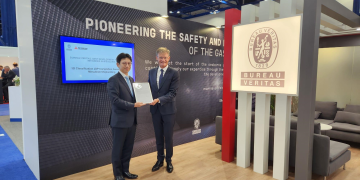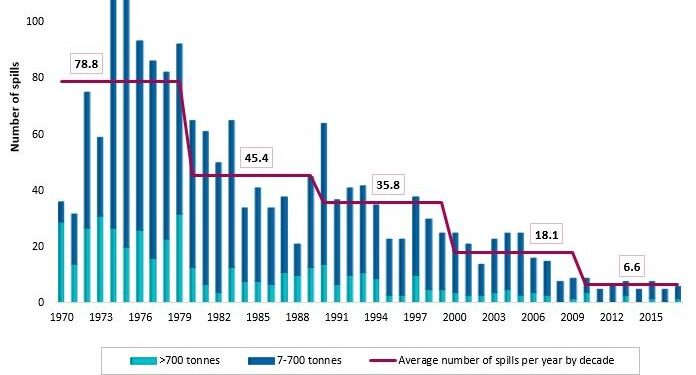The International Tanker Owners Pollution Federation (ITOPF) announced it recorded two large spills (>700 tonnes) and four medium spills (7-700 tonnes) involving tankers in 2017.
The first large spill occurred in June, when the ‘Rama 2‘ sank in the Indian Ocean with over 5000 tonnes of oil onboard. The second incident concerned the sinking of Agia Zhoni II off the coast of Greece in September, spilling about 700 tonnes of oil.
Of the four medium sized spills, two were recorded in January 2017 in South Asia and Southeast Asia; both resulted from collisions and involved the release of bunker fuel. A third spill was reported in East Asia in August. This also involved bunker fuel and resulted from a vessel grounding in bad weather. The fourth medium-sized spill occurred in October in the USA.
Quantities of oil spilt in 2017
The total volume of oil lost to the environment recorded in 2017 was approximately 7,000 tonnes, the majority of which can be attributed to the large spill (>700 tonnes) that occurred in the Indian Ocean in June.
Over the last 48 years, statistics for spills greater than 7 tonnes from tankers show a marked downward trend.
Tanker spills from 1970 to 2017
ITOPF notes the number of large spills (>700 tonnes) has decreased significantly over the last few decades and since 2010 averages 1.8 per year. The progressive reduction in the number of large spills is significant when data is analysed per decade rather than annually. Data recorded from 1970 to 2017 illustrate fluctuations in the yearly values within a decade.

A decline can also be observed with medium sized spills (7-700 tonnes), where the average number of spills per year in the 1990s was 28.1, reducing to 14.9 in the 2000s and is currently 4.9 for the 2010s (not a complete decade).
While increased tanker movements might imply increased risk, it is encouraging to observe that the downward trend in oil spills continues despite an overall increase in oil trading over the period.

*only 8 years of data / Credit: ITOPF
When looking at the frequency and quantities of oil spilt, it should be noted that a few very large spills are responsible for a high percentage of the oil spilt. ITOPF cites the following examples:
- In the 1990s there were 358 spills of 7 tonnes and over, resulting in 1,134,000 tonnes of oil lost; 73% of this amount was spilt in just 10 incidents.
- In the 2000s there were 181 spills of 7 tonnes and over, resulting in 196,000 tonnes of oil lost; 75% of this amount was spilt in just 10 incidents.
- In the eight year period 2010-2017 there have been 53 spills of 7 tonnes and over, resulting in 47,000 tonnes of oil lost; 80% of this amount was spilt in just 10 incidents.
In terms of the volume of oil spilt the figures for a particular year may be severely distorted by a single large incident. This is clearly illustrated by incidents such as ATLANTIC EMPRESS (1979), 287,000 tonnes spilt; CASTILLO DE BELLVER (1983), 252,000 tonnes spilt and ABT SUMMER (1991), 260,000 tonnes spilt.

A summary of the top 20 major spills that have occurred since the TORREY CANYON in 1967 is given below. It is of note that 19 of the 20 largest spills recorded occurred before the year 2000. A number of these incidents, despite their large size, necessitated little or no response as the oil was spilt some distance offshore and did not impact coastlines. For this reason some of the names listed may be unfamiliar. EXXON VALDEZ and HEBEI SPIRIT are included for comparison although these incidents are further down the list.































































